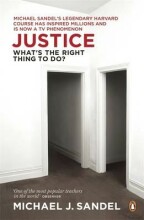Doing the right thing - The greatest happiness principle / Utilitarianism
9 important questions on Doing the right thing - The greatest happiness principle / Utilitarianism
Describe the two rival approaches to justice? (Sandel)
2 Consequences are not all we should care about, morally speaking: certain duties and rights should command our respect, for reasons independent of social consequences.
Bentham's utilitarianism exerts a powerful hold on the thinking of policy-makers, economists, business executives, and ordinary citizens to this day. What are his 3 key statements?
2 The right thing to do is whatever will maximize 'utility'. Whatever produces pleasure or happiness, and whatever prevent pain or suffering.
3 We are all governed by the feelings of pleasure and pain. They are our 'sovereign master'. They govern us in what we do and also determine what we ought to do.
Summarize the 3 main thoughts of Bentham and provide 2 objections:
-Utility = whatever produces pleasure or happiness, and whatever prevents pain or suffering. Pain and pleasure are the sovereign masters.
-Government/laws/policies: do whatever maximizes the communities happiness.
Objection 1: individual rights (no respect to those rights)
Objection 2: A common currency of value (it weighs preferences without judging them and everyone's preferences count equally)
- Higher grades + faster learning
- Never study anything twice
- 100% sure, 100% understanding
Describe the two main objections against utilitarianism? (greatest happiness for biggest group)
2 All values can't be captured by a common currency of value (utilitarianism claims to offer a science of morality, based on measuring, aggregating and calculating happiness. It weighs preferences without judging them. Everyone's preferences count equally. Think about case with the unsafe Ford car: can all values be translated into monetary terms?
What are the 2 objections regarding utilitarianism of Mill?
2 It wrongly reduces everything of moral importance to a single scale of pleasure and pain.
>Mill tried to save utilitarianism by recasting it as a more humane, less calculating doctrine.
Summarize the thoughts of Mill, his answer to the 2 objections made to Bentham's utilitarianism:
-Answer to objection 2: distinguish higher and lower pleasures to assess to quality of our desires.
Mill thinks he can make this distinction between higher and lower pleasure, without relying on any moral ideas other than utility itself. What is meant with higher and lower pleasure?
Lower: the opposite. Maybe perverse pleasures, like bloody spectacles (f.e. arena's), that violate the rights of the victims.
> The higher pleasures are not higher because we prefer them we prefer them because we recognize them as higher
Describe the 3 principles of liberty according to Mill?
2 Government may not interfere with individual liberty in order to protect a person from himself, or to impose the majority's beliefs about how best to live
3 The only actions for which a person is accountable to society are those that affect others
Describe the problems (according to Van Dijk) with utilitarianism:
2 The violation of fundamental rights
3 Availability of proper information
4 What are the sources of my happiness (for ex. pleasure by using drugs: not everybody will like this preference)
The question on the page originate from the summary of the following study material:
- A unique study and practice tool
- Never study anything twice again
- Get the grades you hope for
- 100% sure, 100% understanding































